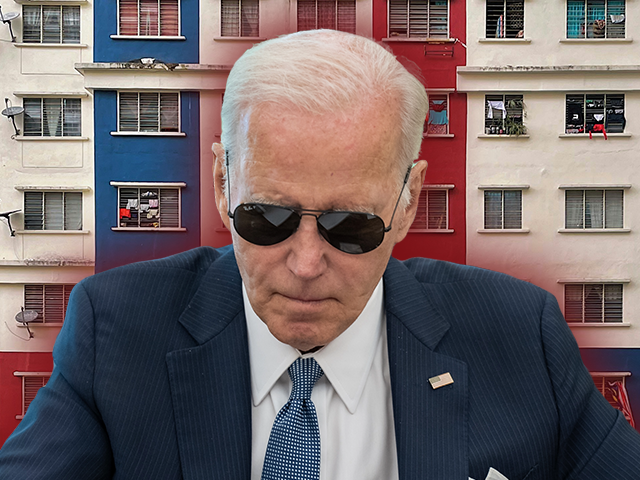Biden’s Bungled Rent Control Proposal
President Joe Biden on Tuesday unveiled a national rent control scheme capping annual rent increases at $55.
Speaking at the 115th NAACP National Convention in Las Vegas as part of his campaign to stem the tide of black voters moving to the Trump camp, Biden announced a sweeping new rent control program—although not quite the one he meant to.
“Look, folks, the idea that corporate-owned housing can raise your rent by 300, 400 bucks a month or something?” Biden told the audience. “Well, I’m about to announce that they can’t raise it more than 55 dollars.”
As awkward as that sounds in print, the video of the announcement is even worse. Biden clearly struggles with the teleprompter, stumbling over his words, squinting, and pausing awkwardly. Instead of reassuring Americans about tackling inflation and soaring housing costs, it raises doubts about his ability to handle basic presidential duties.
It turns out Biden misspoke. He isn’t proposing a $55 cap on annual rent increases but a five percent ceiling. So, the president bungled the introduction of his administration’s latest policy proposal.
By subscribing, you agree to our terms of use & privacy policy. You will receive email marketing messages from Breitbart News Network to the email you provide. You may unsubscribe at any time.
A Deeply Flawed Policy Proposal
The actual proposal is not much better. The White House said it would seek legislation to deny landlords “valuable federal tax breaks” if they increase rents by more than five percent a year. This scheme targets “corporate” landlords managing over 50 units, about half the country’s rental stock.
This is classic government overreach in response to inflation. Government policies drive up inflation, devaluing the dollar and pushing prices up, and then they try to impose price controls, doubling down on the public’s misery.
In this case, it’s especially perverse because inflation has driven up the cost of labor and materials that landlords need for property maintenance. If labor costs rise by more than five percent, there’s no adjustment in Biden’s rent control. Building owners will have to accept lower returns or even lose money on their investments.
And this inflation penalty would come on top of the eviction moratoriums that Biden only reluctantly allowed to expire after the Supreme Court ruled that the policy exceeded the administration’s legal authority.
You can see the short-term political gain here. It shifts the burden of inflation from the broader public to landlords. This isn’t about controlling inflation but reducing its political cost to the Biden administration.
That, in itself, is problematic because it makes it easier for the administration to continue its inflationary policies. In essence, national rent control would likely result in more inflation, not less.
The Malignant Economic Consequences of Rent Control
Rents have surged during Biden’s presidency. Over the past four years, they are up 30 percent nationwide. That’s faster than the overall rate of inflation but not by much. For example, the cost of paint has also risen by 30 percent. Insurance costs are skyrocketing, and the prices of pipes and wiring have soared.
So, what are these enticing tax breaks Biden plans to use to enforce his rent cap? According to the press release, they include “faster depreciation write-offs.” Currently, residential rental property owners can depreciate buildings over 27.5 years, rather than the 39 years for other commercial real estate. This shorter depreciation period incentivizes investment in rental housing.
Imposing rent control tied to these tax benefits would do the opposite. It would reduce investment in rental housing, worsening the housing shortage that has driven rents up.
The White House contends this rent-control ultimatum won’t deter new housing investment because it applies only to existing units. However, developers will anticipate that such policies could eventually extend to new units, affecting their investment decisions. Lower returns on existing developments mean less capital for new projects.
This reflects a broader theme in Bidenomics: the assumption that supply will remain abundant even if regulation and taxes reduce investment returns. Policies built around this assumption discouraged investment and prolonged inflation in the first place.
Rent control would also reduce available units for new tenants, including recent college graduates. Those with below-market leases capped at five percent would be reluctant to move, effectively taking rental properties off the market. This mirrors the lock-in effect causing an undersupply in the owner-occupied housing market.
Moreover, applying this to existing units could face a constitutional challenge under the takings clause. By depriving investors of reasonable expectations to raise rents with rising costs and demand, the government would arguably violate the constitutional prohibition of taking property without compensation.
Real estate is inherently local. A nationwide cap would ignore regional housing market differences. Areas with soaring demand would suffer from price rigidity, preventing rents from meeting rising demand. Companies relocating from California to Texas, for example, would struggle with housing shortages for employees.
Rent control wouldn’t stem inflation. Inflation is a monetary phenomenon, occurring when demand exceeds supply. Capping rents would shift excess demand to other economic sectors, pushing up prices for groceries, cars, and homes. It’s not even a temporary fix for inflation. It just squeezes inflation to other parts of the economy.
Fortunately, this proposal is unlikely to become law. Tax depreciation schedules are fixed by statute, meaning Congress must pass Biden’s national rent-control plan.
Of course, it’s not really intended to become law. It’s another cynical attempt by the Biden administration to buy votes from renters who feel burdened by housing inflation caused by Biden’s policies. The administration lacks a serious policy-making apparatus, relying instead on political schemes dressed up as public policies.

COMMENTS
Please let us know if you're having issues with commenting.